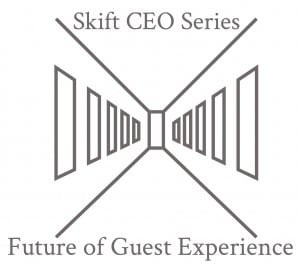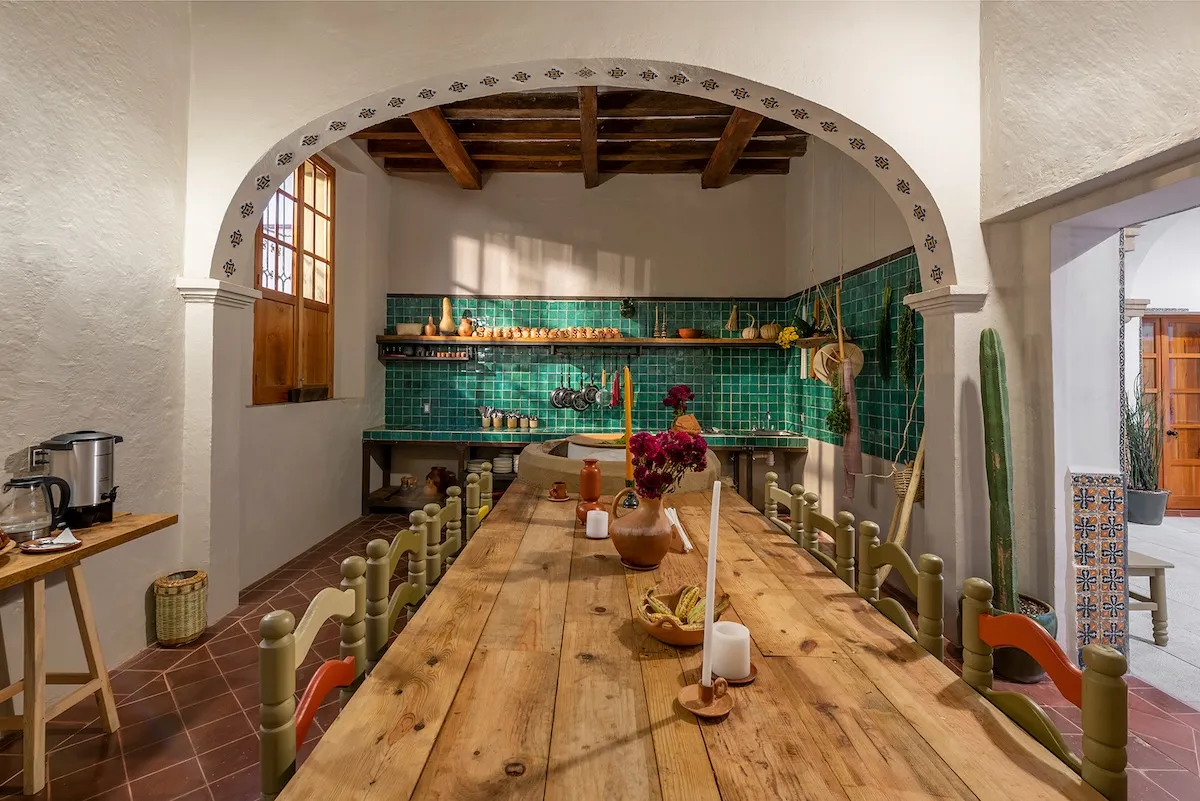Interview: Auberge Resorts CEO Wants to Give Guests More Control

Skift Take
Editor’s Note: This interview is part of Skift's CEO interview series. This particular series is with hospitality CEOs talking about the Future of the Guest Experience and the evolving expectations and demands of hotel guests. Check out all the interviews as they come out here. Also, enjoy the previous series on the Future of Travel Booking, with online travel CEOs.
Auberge Resorts is a high-end collection of owned and operated hotels located across the U.S. and internationally. Each property is designed to reflect their unique outdoor surroundings, with an emphasis on personalized service and access to unique experience.
Auberge CEO Craig Reid joined the group in January 2014 following a more than 30-year career with Four Seasons Hotels and Resorts. His primary task is to expand the Auberge collection internationally through the Caribbean, Latin America, Europe and Africa.
Reid started his hotel career with a four-year apprenticeship that placed him in the hotel kitchen, at the front desk, handling reservations and accounting, setting up room service, and finally getting into management.
“You were learning a craft but it was a rich, rich way to learn," explained Reid in our recent interview.
A hotel collection like Auberge has a different perspective on technology and service than a corporate hotel servicing the same business traveler 200 nights per year. Reid shares his insights and goals in an edited interview below:
Skift: What shifts in guest expectation and demands have you seen in the past couple of years?
Craig Reid: The single biggest thing that we’ve seen post-downturn is people want a greater sense of, what I call, real identity. They want a sincere product and they’re moving away from routine or traditional products. If you were to look at, for example, the top ten hotels that Travel + Leisure or Conde Nast writers historically comment on, it would be big brands. As of late, it’s hotels that are more intimate and bespoke, have a greater sense of personality, and resonate with the environment.
Skift: Have there been any changes in what customers are seeking out or expecting from this breed of more intimate, bespoke hotels?
Reid: Yes, there are a couple of key changes. There’s this idea of being able to have an experience that's catered to the group or the individual. People are becoming more accustomed to having things done their way verse them adjusting to the environment. Simple things like being able to ask how you want something prepared. It's fascinating to sit or stand at the table of guests and see how everybody tweaks the menu. There’s also a great sense of what rooms can offer and how they can be configured.
On the service experience, there's a higher degree of expectation that the service should be tailored to the individual. There’s less adherence to time and protocols and guests really require the service entity to organize the experience around them rather than the guest organize himself around the experience. Itineraries are shifting away from what I call the more traditional forms of entertainment to something more unusual. It has a great richness in connection to the community and a strong sense of being immersed in the location that the guest is in.
Skift: What are some of the biggest challenges that you're facing to improve the guest experience and to meet these new demands of guests?
Reid: I spent a 30-year career with Four Seasons, which is a brilliant company that has a sensational job with service. Yet, there we were looking for ways to become more agile, more responsive to the guests. I was curious as to how that would translate with Auberge: We’re a smaller portfolio and our hotels are smaller.
By virtue of both, it's easier for us to change the way we do things and/or adjust to the sensibilities of the guests. Due to our scale, we're closer to the guests. The guest as an individual verses a room. The larger the hotel, the only way to truly track your guests is by the room number so they're associated with a spot versus as an individual. In a small hotel it's very easy to develop a intimate relationship, to get to know your guests, and for us to have our employees react.
I think the single biggest thing that we're trying to push within our organization is to look for ways to become even more attuned to the guest, to make sure we're not scripted in the way we do things, and to encourage creativity, reward agility, and allow properties to really connect with local communities and share that in a caring way with guests.
Skift: You mention your staff and we’re curious to hear more about how the hiring experience has changed to match these shifts in guest expectation. Have there been any changes to who you hire to match that?
Reid: In our business, the fundamental to hiring has always been to identifying individuals who are truly caring and enjoy serving, who have a personality that quickly warms up to the guests. Certain people have it innately and certain people don't. Our entire screening process is less about skill and more about culture and service affinities.
On that front, things have not changed. We would prefer to take someone with less experience and a personal gift than someone who is very experienced but at risk of being set in their ways. Having said that, we want people who are going to be able to empathize and respond to what the customers' wants are.
I’d like give you one example. I received culinary training in Europe where people were trained in a very strict manner. Fundamentally your customers came in to eat your food and every restaurant had their representation of food. In our restaurant today, we certainly want a chef that has a signature approach, but realistically we need a chef who gets excited about listening to guests’ wants and tailoring food to match that.
Skift: What role does technology play in improving the guest experience?
Reid: It has a role on two levels. One, technology is often the medium by which guests are introduced to you or communicate with you either in the first interaction and/or as a way of reconnecting. So mobility and how we portray ourselves is fundamental. We are in a world now where association and affiliation are key. We look to manage our community, create a relationship, and communicate in a very social way with our customers. Technology gives us the platform to do that and keep a very intimate relationship with our guests in a way that's comfortable and in a medium that they can relate to.
The inside of our hotels have an organic quality and intimacy where I would say, in general, we are less gizmo-focused. However, being able to provide a platform for our guests to link to their world with free Internet and hot-spots is key. We use technology to track our guests’ preferences in a very soft and understated way. Ultimately, it's how you harvest that information and make sure that it's done in a way that is respectful of their privacy.
I think just simple things in terms of making sure that you're providing the tools for the guests to use their own technology in a seamless way. So, for example, lounges today have to have power outlets adjacent to the table settings. That was never the case as little as five years ago, but you go into any lounge and more than likely you'll be looking at tables and the guests will have one, or two, or three gadgets available.
I was just recently at a hotel in Mexico, and I walked into the restaurant in the morning and there were three tables seated and they had these newspapers printed at the front door. I looked at the tables and no one was reading the newspapers, they were all on their iPads, or computers, or phones checking up on news or catching up on their world through their individual tools. Just being able to service that and provide the services for that is key.
We're finding that the key touch points that guests use for services are still primarily the phone, the hotel phone. But, I think we're at a tipping point where they will migrate away from their phone and be looking to use tablets as a way to communicate with the hotel as to their needs, and maybe for greater control of the room. In all honesty, because of our scale, we're not a pioneer on that subject, but we'd like to keep abreast of key industry trends.
Skift: What are your views on this increase in fees and does that have any space in a place like Auberge?
Reid: No, not at all. Wi-Fi at our hotels is free. Quite frankly, if rooms are available early, we'd love to have the guests there early and if the guests need to stay late, it's our pleasure to be able to accommodate them. I would say the entry point is higher, our average rate in North America is close to $1,000 so these are just some of the simple things that we include in the price point. Our sense is that our profile of guests is very discerning or ultra wealthy and they really want these sort of things bundled. They want a simple, clean experience without any incremental charges.
Skift: Looking forward, or looking ahead, is this kind of guest desire for a more lifestyle experience for to feel more connected to a destination, like so many of the resorts do, how do you see this evolving? The guest experience for somebody who stays at a hotel at a luxury kind of lifestyle hotel; how does that product continue to evolve to meet guests' evolving needs or desires?
Reid: I see us providing and looking for ways to provide much more choice. You typically go to a hotel, which has a line of soaps and a line of linens and one approach to food. I think the guest wants to be provided choice.
If you think about the hotel experience, guests go up to a wall where there’s a receptionist who looks at a screen, selects a room and gives you a piece of plastic. It’s almost a secretive and surreptitious in how it happens.
Compare that to where the airlines have gone, where customers control the screen, seat and menu in advance. I think that's just become the norm. Customers go into a shoe store and select the material or assemble furniture by matching different bottoms and tops. I think the hotel industry has to do the same thing and offer guests choices of pillows, sheets, and mattress strength, to allow the guest to be able to select the room type. Some guests want baths, some want big showers. Some guests want more furniture, some want less furniture. This is on the physical side.
On the service side, the guest is saying, “My flight from Europe arrives in early in the morning and I need availability then. I expect you to tailor the experience to me versus me having to conform to you."
I see the whole dynamic of hotels responding to the customer more at the luxury and very high end; however, if it’s extremely expensive then it's harder for the middle of the market to deliver that.
Skift: It will be interesting to see the day when you can cater your hotel experience as much as a pair of customized Nike’s.
Reid: Right. One of my goals in the short term is for guests to be able to check in to the hotel as they’re going from the airport to the hotel. Then certainly they can look up the available rooms and decide whether or not you want the room that I selected for you. Same thing with the menu. How do you want it done? So that the menu really becomes a reference point and maybe some points of expertise, but we would encourage you to, sort of, craft your own experience and tell us how you want it done.
Skift: Is there anything about the guest experience that I haven't touched on that you would like to speak to?
Reid: The single most important thing throughout the guest experience has always about the interpersonal exchange, which will be defined by the quality, motivation, and inspiration of the employee. I see our responsibility as a business, first and foremost, is selecting the best employees. Secondly, that we do the best job inspiring them. Lastly, providing them with the tools and know-how to really create magical moments for our guests. That will be the most defining point of experience, always.





